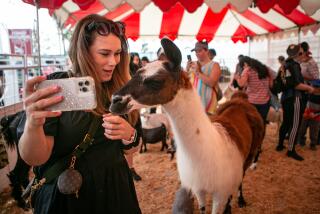Officers Make Animal Care a Priority at Fair
- Share via
VENTURA — Armed with the most up-to-date animal codes and regulations, the women wearing black jeans and with gold badges on their belts entered the fair building and split up.
Each took an aisle.
Officer Shawna Boatman headed past the cages of mini-lop-eared rabbits, briskly scanning for dirty water, empty food dishes or the telltale soiled hay of unchanged cages.
Officer Joyce Houde peered purposefully into the cages of the dwarf hotots and Himalayan black rabbits.
As she walked by a Netherland dwarf silver Martin bunny cowering in the corner of its cage--its little white nose quivering excitedly--Houde slowed.
“This guy is out of food,” she said, gesturing toward an empty can. “We don’t make a big deal about food as long as they have water in case it gets hot, but . . . “
She made a mental note of it for when she would return the next day.
Boatman and Houde are Humane Society officers making daily rounds of the hundreds of goats, horses, pigs, ponies, birds, rabbits and other animals displayed at the Ventura County Fair.
Officers from the society--a nonprofit organization dedicated to the protection and adoption of homeless animals--will spend approximately 40 hours during the 12-day fair ensuring that all animals are properly cared for.
“We will observe every rodeo and will walk through the animal exhibits daily,” said Boatman, whose specialty is horses. “We check for hazards in the pens and cages, we make sure that the animals have fresh water and bedding, and if there are problems we will work with [owners] to correct them.”
As the women finished their rounds in the rabbit building, a man rushed by with a bucket of water, scurrying to top off the animals’ water supplies.
“Just the process of the officers going through keeps people on their toes,” said Senior Humane Officer Jeff Hoffman.
As the inspection officers moved toward the sheep and goat area, they first stepped into the livestock office, checking to make sure that a veterinarian is available at all times.
They were also interested in informing the livestock director about the newest state regulations prohibiting the ultra-short tail cutting of lambs born after Jan. 1.
Clipping the tails too short can cause genital mutilation, so those animals may not be exhibited.
Then the trio strolled past the goats.
Hoffman stopped in front of a cage holding four frisky large goats and a kid that appeared to be stuck in the corner.
“Shawna, I don’t like what I see back in the corner,” Hoffman said.
“Oh, is he stuck there?” Boatman asked, trying to get a better look at the kid and extra piece of fencing in the pen.
Linda Colquitt, a dairy goat breeder from San Bernardino who owns the goats, rushed over. “No, that’s so they can go from pen to pen,” she said. Satisfied, they moved on.
Although the officers say they have the ability to arrest owners and search or seize animals if necessary, they stress that their primary role is education.
The officers say they would prefer not to write citations. The idea of taking people to court is especially unappealing, Hoffman said, because that would require gathering evidence, including animals.
“It would take so long,” he said. “And we don’t want to hurt the animals.”
As they moved through exhibits, Boatman and Houde handed out lists of regulations, urging owners to read them and to have veterinary information on hand in case of an emergency.
The officers also concentrate on the rodeo, where riders often use spurs and sometimes wield electric prods.
Boatman will devote herself completely to that event when the rodeo begins this weekend.
But on Friday, the final stop was the corral, where a cowboy was competing in a reining event in which he must slide, stop and spin, while keeping a steer under control.
The contestant raced down the corral, hemming in the steer. The animal bolted back, then forward. Cornered, it crashed into the fence with a thwack.
“Whoa. That’s not needed,” Hoffman said, wincing slightly at the sound.
“Unfortunately, if they’re going too hard, they run into the fence,” Boatman said. “But I checked him, and he didn’t have any injuries.”
Finishing the day’s round, Boardman and Houde were off to check out a report of emaciated pit bulls across the county.
But they will be back tomorrow.
More to Read
Sign up for Essential California
The most important California stories and recommendations in your inbox every morning.
You may occasionally receive promotional content from the Los Angeles Times.













